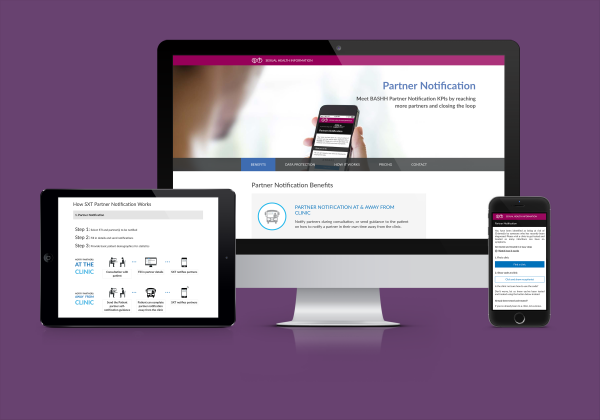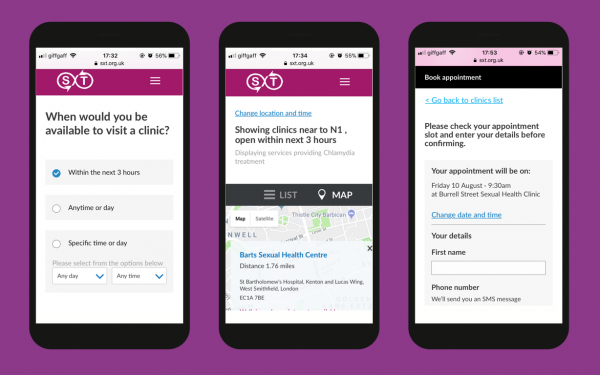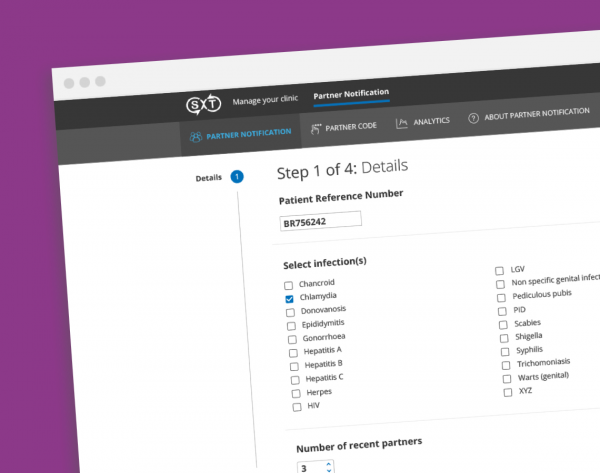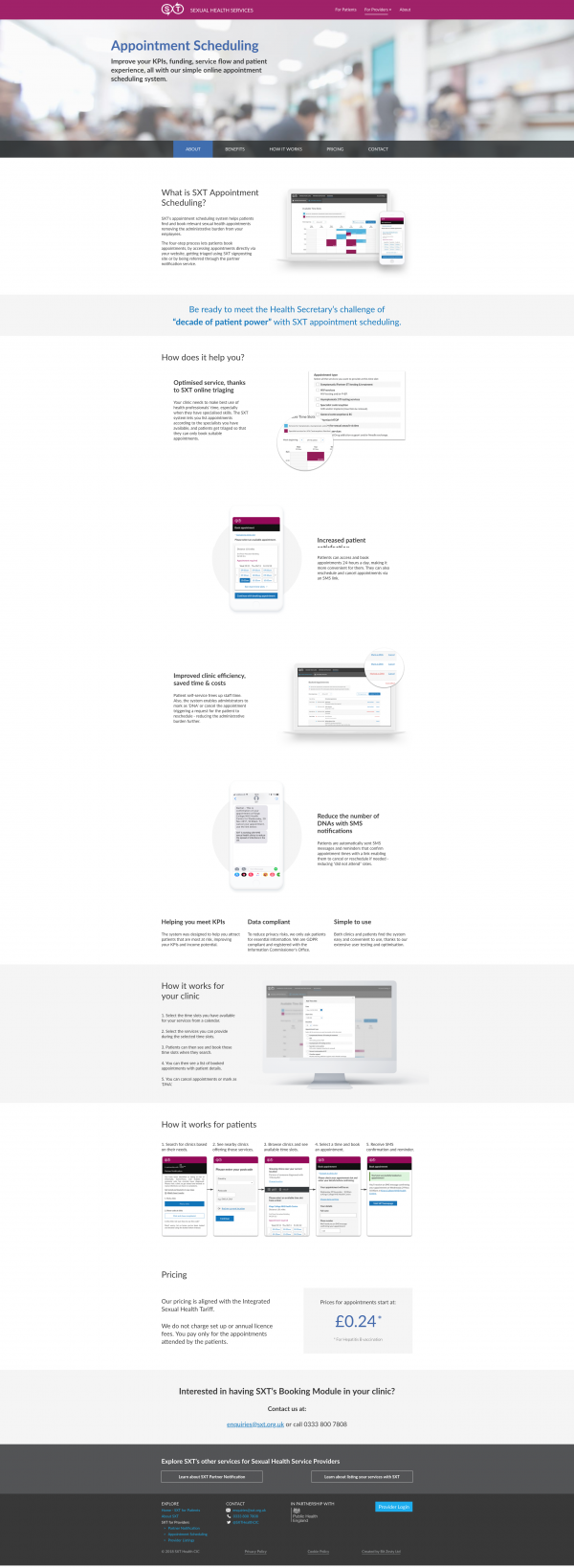






Project Overview
Each year around 500,000 people in the UK are diagnosed with a Sexually Transmitted Infection (STI). The World Health Organisation emphasises the importance of reaching and treating the sexual partners of these diagnosed patients to help reduce the spread of STIs.
However, the major challenge is getting diagnosed patients to notify their partners, as this is not a conversation people like to have.
SXT is a Community Interest Company working to help people access vital sexual health services.
SXT partnered with Bit Zesty to create a digital service that helps diagnosed patients to notify their partners about the risk of infection. The SXT digital Partner Notification (PN) service allows diagnosed patients to provide their sexual partners’ contact details at the clinic or at home and discreetly notify them through an anonymous SMS. We also developed functionality to help notified partners quickly and easily book an appointment at a participating clinic, creating an integrated digital service – from notification right through to the appointment booking.
Since launching, 14 sexual health providers across the UK have adopted SXT’s services, and 8 of these are routinely using the Partner Notification service during patient appointments.
So far, around 5400 diagnosed patients have used SXT’s PN tool, notifying over 7500 sexual partners.
Project Commissioner
Project Creator
Team
Bit Zesty is a London-based digital product agency. Our team of experienced UX designers, project managers, and developers specialise in creating innovative, user-centred digital products for clients across a variety of industries, including healthcare, government, and charity.
Laura Paplauskaite - UX & Product Strategist, Craig Priestman - UX Designer, Matthew Ford - CTO & Technical Architect, Mario Andres Correa - Developer, Mauricio Cinelli - Developer, Tom Openshaw - Project Manager.
Project Brief
SXT engaged Bit Zesty in researching and developing a digital service for patients and clinicians. Our team worked with SXT’s founder, Dr Anatole Menon-Johansson, a team of NHS clinicians, and patients to define user-needs and develop a digital partner notification service.
This project required our team to:
1) Understand the barriers to partner notification and testing, from the perspective of both patients and clinicians
2) Discover how users, including patients, clinicians, and administrators, want to interact with digital sexual healthcare services
3) Deliver a secure, user-friendly digital service for patients to notify their partners about the risk of infection
4) Design and develop digital services which respond to patient needs for accessing sexual healthcare services, including finding a clinic and booking an appointment
5) Develop an administrative interface with functionality for partner notification data analytics and reporting
Project Need
Each year, around 500,000 people in the UK are diagnosed with an STI – to prevent further transmission, these patients need to notify their partners about their risk of infection.
In our work with SXT, we conducted extensive research to find out more. Clinicians told us that diagnosed patients are usually reluctant to provide their partners’ details during consultations and typically promise to contact them themselves – a promise that often isn’t kept. By asking clinicians to act as proxy researchers (a necessity, due to the sensitive nature of the subject), we learned the concerns that patients have about informing their partners – from embarrassment, to fear of domestic violence, to worries over anonymity and data privacy.
Most clinics call a patient’s partners to inform them of their risk of an STI. They then have to call again to check if the partner received treatment and report statistics to The British Association for Sexual Health and HIV. This manual process is extremely time-consuming and frustrating for both patients and health professionals. Clinics are struggling to meet NHS targets for partner testing rates and need an effective solution. Through our ongoing research, it became clear that closing the gap between partner notification and treatment relies on patients being able to find sexual health care services and book an appointment easily.
Investigating the needs of patients, clinicians, and support teams highlighted an opportunity for SXT and Bit Zesty to develop targeted, innovative digital services to help solve these issues.
User Experience
We created a digital tool that allows patients, or the clinic, to anonymously notify partners. SMS messages are sent to partners, informing them that they need to be tested and helping them find their nearest clinic.
Guaranteed anonymity means patients are more willing to notify their partners, which reduces the transmission of STIs.
The service also helps the partners find their nearest clinic and book an appointment to get tested. However, partners are not restricted to the clinics in the SXT network. Any clinic, anywhere in the world, can complete a short web form to verify a partner's attendance and unlock the details necessary to test the partner – automatically notifying the originating clinic and updating the statistics required for reporting purposes.
We took an iterative approach to design, testing paper and digital prototypes with clinicians and patients. We iterated on every detail of the User Interface – from layout and user flow, to creating the most impactful visuals and choosing the right words. We wanted to make sure that, at each touchpoint, the service seems trustworthy and encourages the users to engage with it.
By getting feedback from real users, we delivered a simple, intuitive solution that met the needs of both patients and health professionals. Even now, we continue to gather feedback from all users, monitor analytics and variant test text message and web copy to improve response rates.
Project Marketing
As SXT is a Community Interest Company, its main aim is to provide better access to sexual health services for patients. However, to stay sustainable, SXT charges clinics for each partner notification made and appointment booked.
Our phased approach to launching SXT’s digital service helped to validate the market. Initially, we piloted the service with Guy’s & St Thomas’ NHS Foundation Trust. This allowed us to identify further areas for improvement for both patients and clinicians and create additional functionality in the service – such as appointment booking – to better meet market needs.
SXT’s outreach campaign has seen it’s founder, Dr Anatole Menon-Johansson, speaking at major sexual healthcare conferences. SXT has also approached decision makers at clinics across the UK to implement trials of SXT’s services.
Furthermore, SXT has a network effect. The SXT database includes most UK sexual health clinics. Partners who have been notified through SMS can book an appointment at their nearest clinic and are encouraged to show their SXT notification message so that the clinic knows what to test for. This generates inbound leads from clinics wanting to use SXT’s partner notification and appointment booking services.
Since launching, 14 sexual health providers across the UK have adopted SXT’s services, and 8 of these are routinely using the partner notification service. Many more clinics are showing interest in SXT digital partner notification and appointment booking services, including some in the USA and South Africa.
Project Privacy
The security of sensitive patient data was a high priority within this project. A clear commitment to data protection and anonymity was crucial for building trust in the SXT partner notification service with both patients and clinicians.
To ensure patient confidentiality, we took an ‘information governance by design’ approach. This means that patients’ personal information is not visible inside of SXT and that this information is deleted upon delivery of the service. All patient records are encrypted using the same technology which is used by banks to store credit card data and the military for secure communications.
Digital - Health
From ground-breaking apps accelerating medical research to apps helping consumers make healthier choices, we're looking for apps that are making health information and medical services more accessible to all.
More Details

